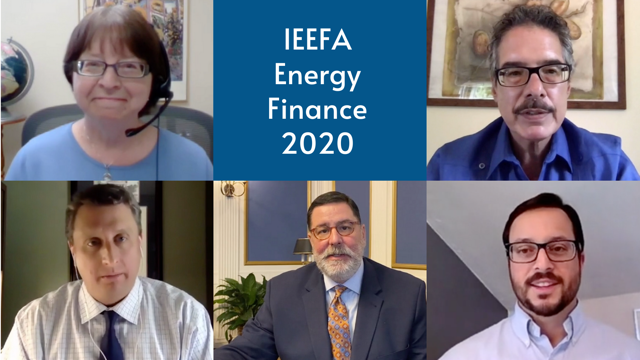IEEFA Energy Finance Online Conference 2020
July 14 - July 30, 2020

Financial Experts’ Projections for the U.S. Electricity Mix – July 14
Investors and credit analysts are weighing the financial risks of the energy sector as the electricity mix continues to change. What are some of the biases and blind spots in evaluating this evolving landscape?
Speakers:
Jim Hempstead, Moody’s Global Project & Infrastructure Finance Group Managing Director
Julien Dumoulin-Smith, Bank of America Securities Research Analyst
Moderator:
Liz Stanton, Applied Economics Clinic Director and Senior Economist
Accelerating the Global Capital Shift Away from Fossil Fuels – July 15
Globally significant financial institutions are increasingly limiting their exposure to fossil fuels, particularly coal. These efforts should not simply target pure-play fossil fuel companies, but also the entire supply chain on which they rely. How best to step up the pace of the energy transition across a wider range of industries?
Speakers:
Heffa Schücking, urgewald Founder and Director
Tim Buckley, IEEFA Director Energy Finance Studies Australia/South Asia
Moderator:
Justin Guay, Sunrise Project Director for Global Climate Strategy
Prospects for the Oil and Gas Industry on a Downward Spiral – July 16
The oil and gas sector continues to struggle financially. Ongoing challenges—global oversupply and a weak macro outlook—have accelerated with the global pandemic. What are the near- and long-term implications?
Speakers:
Kathy Hipple, IEEFA Financial Analyst
Mariana Fernandez, Observatorio Petrolero Sur in Argentina Economist
Moderator:
Nick Cunningham, Independent Journalist
Coal Mine Closures: Current Issues as the Industry Rapidly Declines – June 21
Bankruptcies—and potential company liquidations—are looming for the coal sector. For communities that depend on coal, the combination of worker layoffs and revenue losses can be devastating. Further, the weak financial condition of many coal companies is making mine cleanup more challenging than ever.
Speakers:
Shannon Anderson, Powder River Basin Resource Council Staff Attorney/Organizer
Mary Cromer, Appalachian Citizens’ Law Center Deputy Director
Moderator:
Shannon Fisk, Earthjustice Managing Attorney, Coal
Headwinds for LNG: Cooling Markets, Warming Planet – July 22
A global gas glut, weak demand growth, and rising concerns about methane leaks were deflating the global LNG boom even before COVID-19 hit—and things have just gotten worse. Will LNG rebound, or are the headwinds too strong?
Speakers:
Bruce Robertson, IEEFA Energy Finance Analyst– Gas/LNG
Clark Williams-Derry, IEEFA Energy Finance Analyst
Moderator:
Suzanne Mattei, IEEFA Energy Policy Analyst
Petrochemicals: The Final Frontier for Fossil Fuel Survival? – July 23
Petrochemical plants and projects are being promoted as a lifeline for the struggling oil and gas industry. But there are red flags in the plastics sector both in the U.S. and globally. Investors need a rethink.
Speakers:
Tom Sanzillo, IEEFA Director of Finance
Sharon Lavigne, RISE St. James Founder and President
Moderator:
Lisa Hamilton, Georgetown Climate Center Adaptation Programs Director
Answers to questions raised during the Q&A session, Sharon Lavigne
Under Pressure: The Impetus for Over-Building Pipelines and How to Stop It – July 29
Legal and policy experts will explore issues related to pipeline projects, including: Opposition to the use of eminent domain, strategies to reform federal energy law, the intersection between environmental interests and property rights, economic forces and information wars as well New York’s recent decision to reject the Williams pipeline proposal.
Speakers:
David Bookbinder, Niskanen Chief Counsel
Alexandra Klass, University of Minnesota Law School Professor
Suzanne Mattei, IEEFA Energy Policy Analyst
Moderator:
Rebekah Sale, Property Rights and Pipeline Center Executive Director
Closing Keynote Address: Political Leadership on Global Climate Change, Divestment and the Energy Transition with William Peduto, Mayor of Pittsburgh – July 30
Mayor Peduto has called for increased investments in green energy and a move away from fossil fuel-based industries and projects. Despite mounting pressure from the fracking and plastics sectors, Peduto has opposed plans for creating a petrochemical hub in the region.
Following the mayor’s remarks, Pittsburgh’s Chief Resilience Officer Grant Ervin and Matt Mehalik, Executive Director of the non-profit Breathe Project, joined moderator Steven Carbó for a discussion and live Q and A about the ways in which communities can lead the energy transition.
Speakers:
William Peduto, Mayor of Pittsburgh
Grant Ervin, Pittsburgh Resiliency Officer
Matthew Mehalik, Executive Director, Breathe Project
Moderator:
Steven M. Carbó, Esq. Principal, Carbó Strategic Consulting LLC
Financial risks of carbon capture for coal-fired power plants – June 17
Much ado has been made over the potential of Carbon Capture and Storage (CCS) technology to reduce carbon emissions by permanently storing or recycling the captured CO2 for use in Enhanced Oil Recovery. Several proposed projects, most notably the Kemper plant in Mississippi, were canceled because they were uneconomic. To date, only two CCS projects for coal have become operational globally, and are operating at much lower capacity than promised.
This webinar features David Schlissel, IEEFA director of resource planning analysis. Liz Stanton, executive director of Applied Economics Clinic moderates a question and answer session for participants.
This was a pre-conference session for IEEFA’s Energy Finance 2020 online conference.
Speaker:
David Schlissel, Director Resource Planning Analysis, IEEFA
Moderator:
Liz Stanton, Director and Senior Economist, Applied Economics Clinic
Energy, finance, and policy experts explore the global energy transition
In case you missed it, you can still experience IEEFA’s Energy Finance Conference 2020 that was held online July 14-30. Find the agenda and session recordings below.
